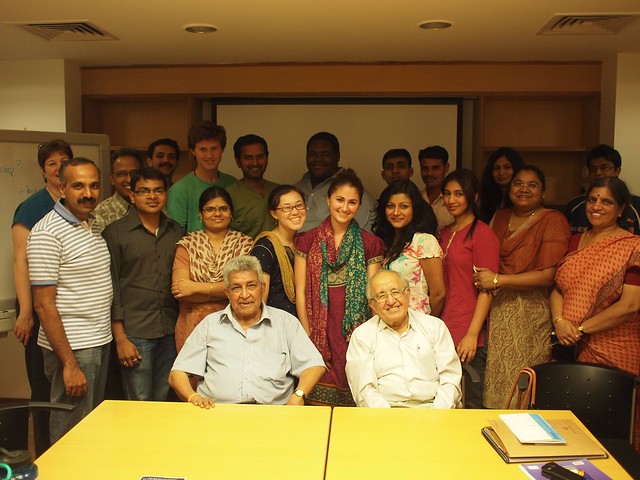By Kipaya Kapiga
This is part two of two-part blog post.
It can be difficult for social ventures to maintain as sense of integrity when it comes to compensation. As is the case with American non profits, there is a general perception of social ventures and non-profits in particular as being feel-good-and-no-one-ever-gets-fired places. In that kind of a setting, I imagine a lot of people might be uncomfortable with the idea of an employee going home with anything more than a modest income.
This debate has a lot to do with how social entrepreneurship is taught. I had the pleasure of meeting some students of SE at the CSIM session we attended during our time in Bangalore.  SE is a booming field and one that has gotten increasingly popular among Indians. Social entrepreneurship means different things to different people, so it’s no surprise that it can be taught differently by different groups. As we move from person-to-person, country to country, we have different notions of what a social entrepreneur is and how they should act. This is the case with most other areas of study like economics programs where some programs might be conservative or liberal or can favor either Institutionalist approaches or Marshallian approaches.
SE is a booming field and one that has gotten increasingly popular among Indians. Social entrepreneurship means different things to different people, so it’s no surprise that it can be taught differently by different groups. As we move from person-to-person, country to country, we have different notions of what a social entrepreneur is and how they should act. This is the case with most other areas of study like economics programs where some programs might be conservative or liberal or can favor either Institutionalist approaches or Marshallian approaches.
In general, the idea of teaching entrepreneurship strikes me as being somewhat counterintuitive. Entrepreneurship has been broken down into a lot of different concepts and a lot of different processes, but one thing all these conceptualizations have in common is the belief that entrepreneurship involves the pursuit of a venture, project or goal that doesn’t fit with current financial and nonfinancial resources. No matter the definition, I think most people in the field would agree that in order to be a successful entrepreneur means being able to identify resources, including knowledge and training, needed for a project and finding ways to meet those needs. An entrepreneur is therefore someone who has to be comfortable with the idea that they’re not always going to have all the knowledge needed to do something. That can also mean that an entrepreneur has to be ready to bring in people into the organization who aren’t necessarily there because they want to save the world.
On the issue of paying the people who work in nonprofits, here is what I’ve concluded: there is no magic percentage and there’s definitely no magic number that will ensure that the social entrepreneurs or employees working in the social sector are compensated enough. Every venture is different and in the long term, it’s more advantageous to look at impact if you really want a good sense of an organization’s integrity. Ultimately, all social ventures must cope with the reality that different people join nonprofits for different reasons and it’s not difficult for me, having now gone through the SE consulting experience twice now, to imagine that some people might be drawn to an organization because of a particular professional interest.
For instance, someone from a finance background may start working at a nonprofit involved in complex new forms of microfinance because they want to be on the cutting edge of this finance innovation. In the end, the motives and interests don’t add or subtract value from the work being done, so it doesn’t seem helpful to me anyway for social ventures to straitjacket themselves by believing that anyone working in the social sector must accept wages that are below what they can receive in the market.





